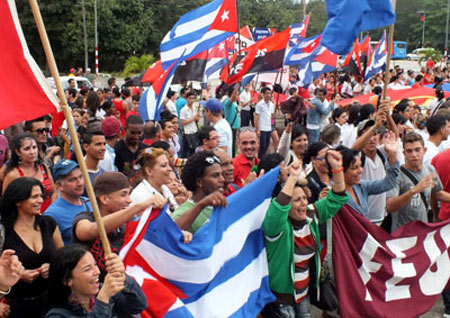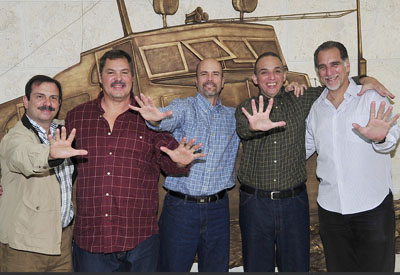The return to Cuba Dec. 17 of Gerardo Hernández, Ramón Labañino and Antonio Guerrero, joining previously released members of the Cuban Five — René González and Fernando González — was greeted with widespread spontaneous mobilization and celebration across the island.
Carrying themselves with the same dignity and firmness of purpose they had displayed while behind bars, all five volunteered for whatever assignment should be asked of them next to defend and strengthen the Cuban Revolution.
The leadership caliber of the five revolutionaries was evident when they were invited to take part in the Dec. 21 “Light in the Darkness” program on Radio Rebelde (Rebel Radio) hosted by Arleen Rodríguez. While behind bars, the Five had sometimes been able to pick up the radio signal of the Sunday night program dedicated to the fight to free them.
The Five were asked about their impressions of Cuba after their long absence. Each spoke of the economic and social challenges in Cuba, their confidence in the Cuban people and their commitment to the revolution. Each acknowledged the impact on the economy, the infrastructure and on revolutionary consciousness of the U.S. trade embargo and the “special period,” the decade of severe economic crisis in the 1990s caused by the precipitous end of aid and favorable trade relations with the Soviet Union and Eastern Europe following the collapse of those countries’ governments.
“Sometimes I see Cuba and try to think about a country that suddenly lost 75 percent of its trade, and had the capacity to go through the special period and emerge as we have,” said René González. “There’s something in the spirit of our people that made this possible.”
During their imprisonment, the Five followed news and politics in Cuba and the world. “The compañeros in our Interests Section in Washington always sent us a big folder each week with everything published on Cuba, so we were well informed on what was happening,” Hernández said. “We know well the negative effects the special period had not only economically, but on people’s consciousness.” He added that the Five “have full confidence in our people to move forward.”
At the same time as President Barack Obama and Cuban President Raúl Castro announced the freeing of Hernández, Labañino and Guerrero, they announced Washington and Havana would resume diplomatic relations.
However, as Castro cautioned that day, “This does not mean the heart of the matter has been resolved. The economic, commercial and financial blockade, which causes enormous human and economic damage to our country, must cease.”
Moves by the Obama administration and articles in the New York Times, Washington Post and other capitalist media in the week following the announcement confirmed that the U.S. ruling class wasn’t backing off one inch from its more-than-five-decade effort to overthrow the Cuban Revolution.
Increasing numbers of the propertied rulers back trading the Five for U.S. spies and opening discussion of diplomatic relations as steps to take advantage of new openings to undermine the Cuban Revolution. The move is based on the success of the imperialist embargo grinding on Cuban workers and farmers, not its failure.
In addition, freeing the Five and relaxing a “pointlessly harsh policy,” as the New York Times said in a Dec. 17 editorial, is aimed at removing an obstacle to broader efforts by Washington to step up activity, court influence and confront competitors throughout Latin America.
Pivot to Latin America
Noting that for more than 50 years “Washington’s squeeze on Havana has poisoned its relations with the region,” a Dec. 22 Financial Times editorial praised Obama’s move. “Rapprochement vaporizes a rhetorical bludgeon that U.S. critics have routinely used to cudgel Washington,” it said.The Obama administration, portraying the Cuban government as a weakened foe and the socialist revolution as a failure, is deepening its intervention in class relations in Cuba with the aim of strengthening counterrevolutionary and pro-capitalist layers. This includes backing “dissidents” and “independent” librarians and journalists, as they describe counterrevolutionaries supported and financed by the U.S. government and its various agencies, in the name of “democracy”; more contact with those running businesses; and more leeway to expand access to U.S. propaganda on the internet.
“We certainly hope that the Cuban government will allow us to engage with those who are self-employed, those who are entrepreneurs,” said Assistant Secretary of State for Western Hemisphere Affairs Roberta Jacobson, the administration’s lead negotiator in upcoming talks with the Cuban government in Havana, in a Dec. 30 Public Broadcasting Service interview.
Asked about critics of the new policy who say the U.S. is throwing a lifeline to Cuba, Jacobson replied, “Well, I don’t think that’s true. For one thing, the embargo is still in place.”
The Five were arrested and jailed in 1998 by the Clinton administration on frame-up charges of conspiracy to commit espionage and, in the case of Hernández, conspiracy to commit murder, for which he received a double life sentence plus 15 years. Hernández was a special target of Washington’s frame-up because he served as organizer of the network of Cubans who volunteered to gather information on paramilitary forces in southern Florida who had carried out violent attacks on the island and against supporters of the Cuban Revolution in Puerto Rico and the U.S.
The strength and honorable conduct of the Five behind bars, the unwavering support they received from the revolutionary government and people of Cuba, and a growing international campaign to free them led to the December victory.
“The effort of each and every one of you has contributed to making this triumph possible,” wrote Hernández and his wife Adriana Pérez in a Dec. 31 message to all who supported them over the years. “For more than 16 years the Five have dreamt about this happiness that we are now living. Your continued struggle on our behalf has made this all possible. And today, as we are showered with the love of our people, the gratitude for all the sisters and brothers, from around the world, who have supported us during this time is multiplied.
“On behalf of the Five and our families we wish you a happy and very successful 2015,” they said, “and congratulate you on the 56th anniversary of the Cuban Revolution.”
The Five are moving on to new challenges and responsibilities. “We have turned the page on the suffering and abuses of prison,” Hernández said on the popular “Mesa Redonda” (Round Table) television program Dec. 18. When asked if he would continue to draw the political cartoons that were shown around the world during his imprisonment, Hernández said he would consider it “if I have time.”
Related articles:
Cuban Five have been ‘Absolved by Solidarity’
‘My heart is singing for the Cuban Five’
|
Printer-friendly version of this article |















